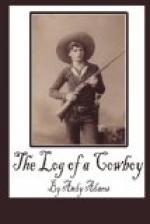Here was a new situation to be met, an eighty-mile dry drive; and with our experience of a few months before at Indian Lakes fresh in our memories, we set our house in order for the undertaking before us. It was yet fifteen miles to the next and last water from the stage stand. There were several dry forks of the Cheyenne beyond, but as they had their source in the tablelands of Wyoming, we could not hope for water in their dry bottoms. The situation was serious, with only this encouragement: other herds had crossed this arid belt since the streams had dried up, and our Circle Dots could walk with any herd that ever left Texas. The wisdom of mounting us well for just such an emergency reflected the good cow sense of our employer; and we felt easy in regard to our mounts, though there was not a horse or a man too many. In summing up the situation, Flood said, “We’ve got this advantage over the Indian Lake drive: there is a good moon, and the days are cool. We’ll make twenty-five miles a day covering this stretch, as this herd has never been put to a test yet to see how far they could walk in a day. They’ll have to do their sleeping at noon; at least cut it into two shifts, and if we get any sleep we’ll have to do the same. Let her come as she will; every day’s drive is a day nearer the Blackfoot agency.”
We made a dry camp that night on the divide between the road house and the last water, and the next forenoon reached the South Fork of the Big Cheyenne. The water was not even running in it, but there were several long pools, and we held the cattle around them for over an hour, until every hoof had been thoroughly watered. McCann had filled every keg and canteen in advance of the arrival of the herd, and Flood had exercised sufficient caution, in view of what lay before us, to buy an extra keg and a bull’s-eye lantern at the road house. After watering, we trailed out some four or five miles and camped for noon, but the herd were allowed to graze forward until they lay down for their noonday rest. As the herd passed opposite the wagon, we cut a fat two-year-old stray heifer and killed her for beef, for the inner man must be fortified for the journey before us. After a two hours’ siesta, we threw the herd on the trail and started on our way. The wagon and saddle horses were held in our immediate rear, for there was no telling when or where we would make our next halt of any consequence. We trailed and grazed the herd alternately until near evening, when the wagon was sent on ahead about three miles to get supper, while half the outfit went along to change mounts and catch up horses for those remaining behind with the herd. A half hour before the usual bedding time, the relieved men returned and took the grazing herd, and the others rode in to the wagon for supper and a change of mounts. While we shifted our saddles, we smelled the savory odor of fresh beef frying.
“Listen to that good old beef talking, will you?” said Joe Stallings, as he was bridling his horse. “McCann, I’ll take my carne fresco a trifle rare to-night, garnished with a sprig of parsley and a wee bit of lemon.”




